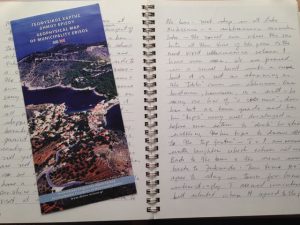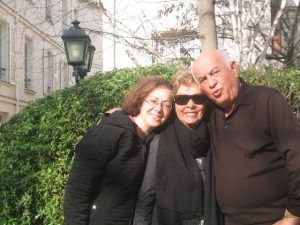Posts Tagged ‘dying’
A Life In Script
I feel the absence of my mother most keenly when I catch a glimpse of her writing.
When I look at the carefully crafted words and sentences she moulded; the ones she wrote down. An alchemy of thought, energy, effort, pen, and paper.
Mom used writing to express her thanks. To scold political leaders. To extend congratulations. To advocate for causes. To nurture connections.
She cherished the handwritten note even after her grandsons helped her learn to use email.
My mother believed there was a personal quality to a handwritten note that was impossible to replicate in type form. I agree. Each stroke of the pen captures a person’s personality, their character, history, and experience. The way in which hand-written words create a web of meaning is the most affirmative statement of “I am here”. When I catch sight of my mother’s writing script I wonder how it is that she is not here.
How can the person whose heart propelled the pen across the page not be here to cross that t and dot that i?
I feel the absence of my mother most keenly when I see her writing, with an intake of breath and a vise clamped around my heart.
My mother’s script is from an earlier era when education had not been commodified and contorted. When it was a gift to learn. A time when writing was valued not only for its content but for its form. When penmanship spoke of culture and education and, yes, privilege.
That script, her unique cursive style, is undeniably and uniquely my mother, Yulanda.
I feel the absence of my mother most profoundly when I stare at her writing.
René Descartes said, “I am thinking, therefore I am.” My mother’s cursive script says, “I wrote, therefore I have been.” And as the ability to recall her physical presence becomes the dream of time lapsed, her writing will remain forever real and tangible.
As her daughters, her children, and perhaps someday her grandchildren and descendants, we will carry her DNA forward in time. However, her letters, the drafts of her speeches, the thank-you cards, her recipes, the quotations she noted down, her signature — like the one in the volume of William Shakespeare’s collected works that she used for her studies at McGill — these all serve as a testament to her personal spirit.
No other hand shaped those words, no other mind developed those ideas, no one else forged those connections: letter to letter, person to person, heart to heart.
I feel the absence of my mother most keenly when I catch a glimpse of her writing. The words and sentences that flowed from the pen she held, the pen she guided into forever.
In the year and months since my mother died (and a month before what would have been her 79th birthday), my family has cried, laughed, and celebrated birthdays, anniversaries, graduations, and weddings. We’ve attended funerals. We’ve had time at home, we’ve been away together and separately. Time has carried us forward. It is life’s imperative.
And she, my mother, has been there with us. In each moment, in each thought, in each word.
She always will be.
“If we danced more and sang more, we’d be happier people.”
Yulanda M. Faris
July 2, 1937 – April 23, 2015

